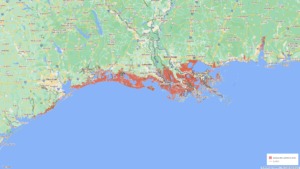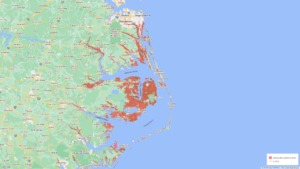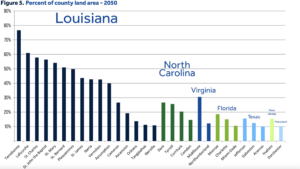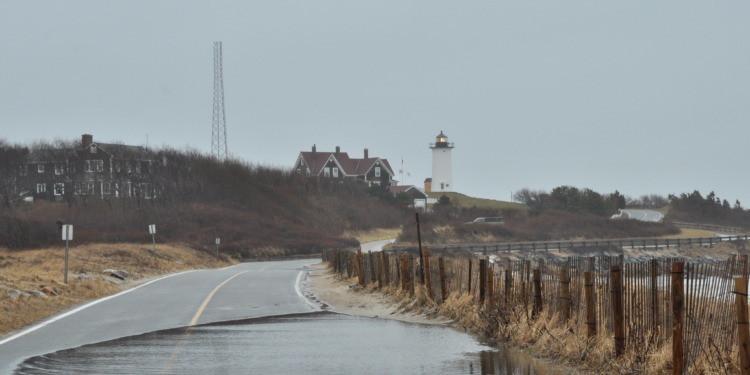Water — not only is it not accessible enough to millions of Americans, but new research now states soon there will be too much.
The latest research conducted by nonprofit group Climate Central reveals a troubling future for the United States as it shows rising sea levels will lead to many coastal homes slipping below tidal lines over the next decades.
To identify the areas most at risk, researchers considered scientific data on projected sea level rise, state tidal boundaries and the records of more than 50 million individual properties across the US.
Rising sea levels will shift coastlines and submerge coastal homes
According to Climate Central, nearly 650,000 individual properties across 4.4 million acres are projected to fall below tidal boundaries by 2050. By 2100, numbers rise to 9.1 million acres of land going underwater.
The authors believe the changes at first will come gradually but will worsen quickly. They point to the fact that many people believe their homes are in the “safe zone,” yet researchers explain that once sea levels reach densely developed elevations, the number of buildings affected will drastically increase despite being in highly elevated areas.
Two of the biggest areas projected to take the worst hits are both the Gulf Coast and Atlantic Coast.
One of the states predicted to be the most hit is Louisiana. More than 25,000 properties in Louisiana accumulating to nearly 2.5 million acres face the risk of falling below tidal boundaries by 2050. This translates to 8.7% of the state of Louisiana.

Florida, Texas and North Carolina face similar threats — accounting for 87% of the land area expected to be lost to the sea by 2050.
According to the researchers’ map (below), some of the most popular vacation beach spots in North Carolina, including Duck and Corolla as well as Alligator River National Wildlife Refuge and Mattamuskeet National Wildlife Refuge, will be below tidal boundaries.

Likewise, the 1.5 million-acre wetland preserve in Florida called Everglades National Park — home to 36 endangered and protected wildlife species including the endangered leatherback turtle — will be entirely underwater according to the study.
States along the East Coast such as Maryland, New Jersey and New York could also see thousands of properties under the tidal boundary — Maryland predicted to see roughly 2,500 homes impacted.
By 2050, thirty counties throughout Louisiana, Florida, North Carolina, Texas, New Jersey, New York and Maryland will have more than 10% of their land area affected, amounting to 3 million acres.

With landscape changes comes economic downfall
Submerged homes will clearly cause a problem for homeowners, but the loss of properties will also negatively affect the revenue of municipal governments as well as the American economy.
Rising sea levels will largely affect communities that rely on tourism, such as beach hotspots Duck and Corolla in North Carolina, and, eventually, these towns and communities will see fewer taxable properties resulting in less money to fund basic communities needs like schools, fire departments, road repairs and sewer maintenance.
The analysis states a plethora of essential community services will be lost.
“Diminished property values and a smaller tax base can lead to lower tax revenues and reduced public services — a potential downward spiral of disinvestment and population decline, reduced tax base and public services, and so on.”
Alongside reduced public services and funding, municipal centers will then have to find the money to remove flooded properties and repair destroyed roads, sewers and other community aspects damaged by the flooding.
Undeniably, the sea level rise is in direct correlation to increased carbon emissions in the atmosphere.
Research conducted earlier this year by the National Oceanic and Atmospheric Administration (NOAA) backs up Climate Central’s findings and also concludes sea level rise could increase by a foot by 2050.
However, both studies come to the conclusion that there is still time to turn things around.
Just weeks ago, the United States passed its biggest climate bill — the Inflation Reduction Act — set to put forth more opportunities for clean energy and technologies to fight climate change.
Yet the bill also does little to reduce fossil fuels in the United States, even increasing opportunities for fossil fuel projects — something counterintuitive as carbon emissions from the fossil fuel industry remains one of the biggest contributors to depleting water resources, sea level rise, heatwaves, wildfires, loss of wildlife species and so much more.
Hopefully, despite setbacks, significant changes will occur in America before half of it is underwater.
Editor’s Note: The opinions expressed here by the authors are their own, not those of Impakter.com — In the Featured Photo: Town suffers from coastal flooding on March 15, 2010. Source: Putneypics, Flickr.










